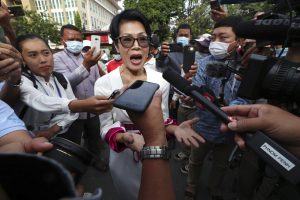Amid tight security and backed by small crowds of supporters wearing face masks, 129 Cambodian dissidents have gone on trial at the Phnom Penh Municipal Court, where they could face up to 12 years behind bars if convicted of treason.
The trial follows a roundup of government critics, in particular, supporters of the banned Cambodian National Rescue Party (CNRP) and its leader in exile Sam Rainsy, who resides in France.
The hearing on Thursday was short-lived, as judges confirmed proceedings would be lengthy and divided the cases into two lots to be heard in January and March next year. The trial was then adjourned.
Among the most prominent defendant is the Cambodian-American lawyer Theary Seng, a long-time CNRP supporter who says she is prepared to go to jail after backing a failed bid by Rainsy to return to Cambodia in November last year.
She now works as a publisher after toning down her activism for most of the last five years.
“It’s ironic that this regime is coming after me now, when I have been quiet, relatively speaking, but still a critic of this regime, transitioning from human rights advocacy to focus more on publishing high quality material for the larger public,” she told The Diplomat.
Theary Seng broke her silence when Rainsy announced he would return to Cambodia on November 9, 2019, and pledged he would lead a “tsunami of supporters,” arrest Prime Minister Hun Sen, and rescue Cambodia from one-party rule.
The bid was thwarted when airlines refused to fly Rainsy into Cambodia, and when neighboring countries refused him permission to cross their borders. However, Sam Rainsy recently said he would again try to return, though declined to say how or when.
Outside the court, Rainsy’s supporters, young and old, insisted he would return to the country, as CNRP dissidents and a troupe of lawyers filed into the courtroom.
But many, fearing arrest, preferred not to be interviewed amid the latest crackdown on dissenters, which has its roots in the 2013 election.
Back then the CNRP, headed by Kem Sokha and Sam Rainsy, went tantalizingly close to winning the popular vote and refused to accept the result claiming the ballot was rigged.
Widespread protests followed, some of which turned deadly.
A subsequent crackdown initiated by Hun Sen – who alleged a “color evolution” was in the making – resulted in the dissolution of the CNRP by the courts, Sokha’s arrest on treason charges, and Rainsy’s flight into self-imposed exile.
The ruling Cambodian People’s Party (CPP), which has governed here in various guises since the Vietnamese military ousted the Khmer Rouge in 1979, went on to win every seat contested at the 2018 election.
Theary Seng said that Rainsy’s attempted return and his “nine finger” campaign had resulted in a lot of international support. The nine-finger gesture represented November 9, the day Rainsy had promised to return and became a popular salute among his supporters in Cambodia.
“Hun Sen threatened anyone who showed nine fingers, with cutting them off. It only made me want to advocate the return some more, which I did,” she said.
The trials began amid mounting international pressure on the CPP government, which is struggling with a dramatic economic slump, largely due to the COVID-19 pandemic.
The European Union has withdrawn some trade preferences due to Phnom Penh’s human rights record and listed Cambodia as a “high risk” money laundering country, which could result in further sanctions.
In the United States, last week, eight U.S. lawmakers wrote to Secretary of State Mike Pompeo urging the outgoing Trump administration to impose targeted sanctions against senior Cambodian officials and to follow the EU’s lead by revoking the country’s trade privileges.
Meanwhile, the French courts are investigating Sam Rainsy after Hun Sen lodged a complaint, alleging “public defamation on an individual.”
He recently urged Cambodians and foreigners to be patient with the legal process saying, “I do not understand why some foreigners push Phnom Penh courts to proceed as soon as possible. If we cannot force the French court, the same goes for the Cambodian court.”
Luke Hunt can be followed on Twitter @lukeanthonyhunt

































